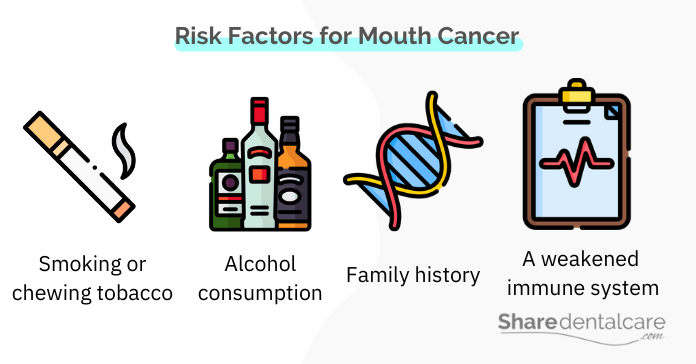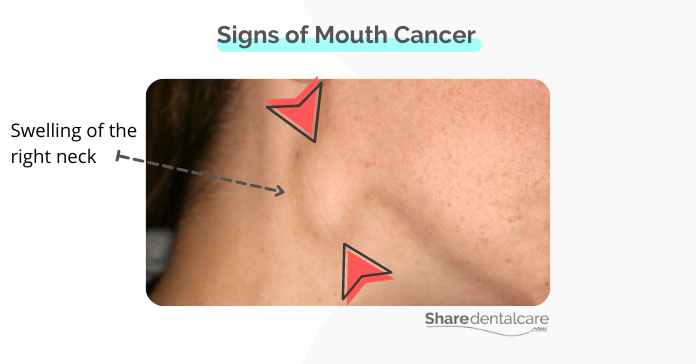Mouth cancer, also known as oral cancer, can develop anywhere in the mouth, including the inside of the cheeks and the gums. It is a serious disease that requires treatment. In this blog post, we will discuss the start of mouth cancer, the risk factors, and how to prevent it.
The Start of Mouth Cancer
Mouth cancer is caused by changes to genes that control the way cells grow and divide. These changes can be inherited from a parent, or they can occur spontaneously. The changes cause the cells to grow and divide uncontrollably, which leads to mouth cancer. Genetic changes that cause mouth cancer can start because:
- An error occurs when the cell divide.
- A person is exposed to cancer-causing agents, such as tobacco or alcohol.
- Inherited mutations (changes) in certain genes increase the risk of developing cancer.
The body normally eliminates cells with damaged DNA. However, sometimes these cells are able to survive and continue to grow and divide. The accumulating abnormal cells form a tumor.
Mouth cancer can start in any part of the mouth, including the lips, gums, tongue, and cheeks. It can also occur in the salivary glands, pharynx, and larynx. You can read more about the first signs of oral cancer.
Risk Factors for Mouth Cancer
The exact cause of mouth cancer is unknown, but there are risk factors that can increase your chances of developing the disease. These include:
- Tobacco use: Cigarettes, cigars, and pipe smoking are the biggest risk factors for mouth cancer. Smokeless tobacco, such as snuff and chewing tobacco, is also a risk factor.
- Alcohol use: Drinking alcohol increases the risk of mouth cancer.
- Betel nut use: Chewing betel nuts, a common practice in some cultures, can cause the start of mouth cancer.
- Diet: A diet low in fruits and vegetables may increase the risk of mouth cancer.
- UV light exposure: People who spend time in the sun or in tanning beds have an increased risk of developing mouth cancer.
- A weakened immune system: people with a weak immune system have a higher risk of developing mouth cancer.
- Family history: Having a family history of mouth cancer is a risk factor. Some gene mutations can be passed down from parent to child.

How to Recognize The Start of Mouth Cancer?
The start of mouth cancer can be difficult to detect. So, it is important to see a dentist or doctor if you have any of the following symptoms:
- A mouth ulcer or sore that does not heal.
- A white or red patch on the gums, tongue, or lining of the mouth.
- Bleeding or numbness in the mouth.
- A lump or swelling in the mouth or neck.
- Difficulty swallowing.
- Difficulty moving the jaw and jaw pain.
- Significant weight loss.
These symptoms can also be caused by other conditions, so it is important to see a doctor for a diagnosis. Mouth cancer is a serious disease that requires treatment. If you think you may have mouth cancer, please see a doctor as soon as possible. Early detection is key to successful treatment.

Treatment Options
Treatment for mouth cancer lesions depends on the stage of the disease. Treatment options include surgery, radiation therapy, and chemotherapy. Surgery is the most common treatment for mouth cancer. The type of surgery depends on the size and location of the tumor. Radiation therapy and chemotherapy may be used before or after surgery.
Mouth cancer is a serious disease, but it is treatable. If you have any symptoms of mouth cancer, please see a doctor as soon as possible. Early detection of oral cancer is the key to successful treatment.
How To Prevent The Start of Mouth Cancer?
There is no sure way to prevent the start of mouth cancer, but there are things you can do to reduce your risk.
- Quit smoking. If you use tobacco products, quitting is the best way to reduce your risk of developing mouth cancer.
- Quit alcohol drinking. If you drink alcohol, limiting your intake can also help reduce your risk.
- Eat a healthy diet. Eating a healthy diet high in fruits and vegetables may help reduce your risk.
- Limit your sun exposure. Spending time in the sun can increase your risk of developing mouth cancer. Wearing sunscreen and limiting your time in the sun can help reduce your risk.
- See your dentist regularly. Seeing your dentist regularly can help catch mouth cancer early.
Conclusion
Mouth cancer is caused by genetic changes in the cells. These changes allow the cells to grow and divide uncontrollably. Mouth cancer can start in any part of the mouth, including the lips, gums, tongue, and cheeks. It can also occur in the salivary glands, pharynx, and larynx.
Tobacco use, alcohol use, and betel nut use are risk factors for mouth cancer. The start of mouth cancer can be difficult to detect. So, it is important to see a dentist or doctor if you have any of the symptoms. Early detection is key to successful treatment.